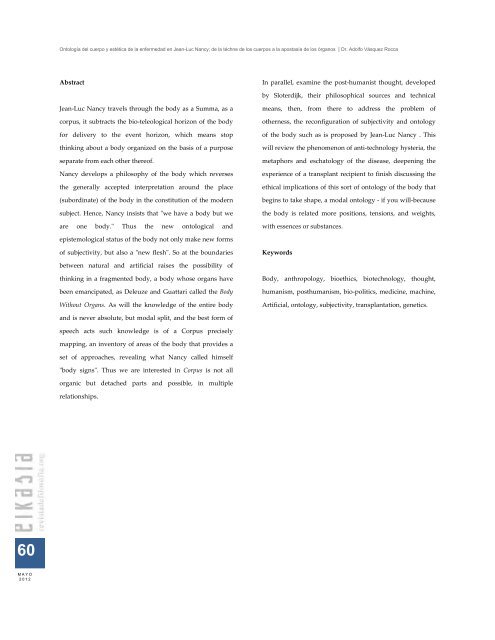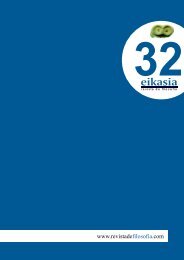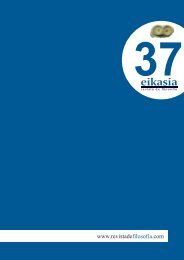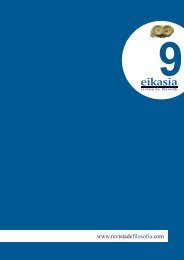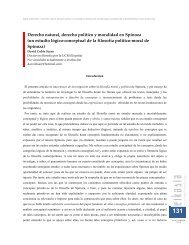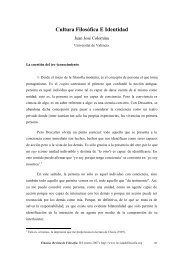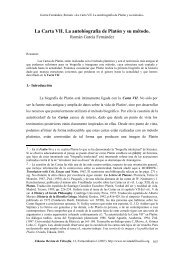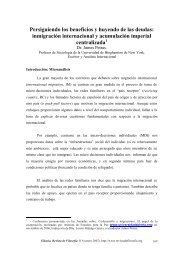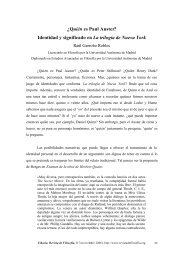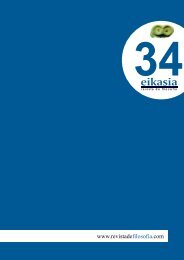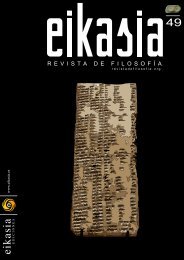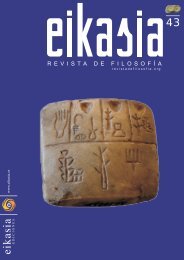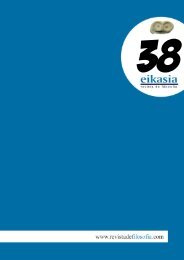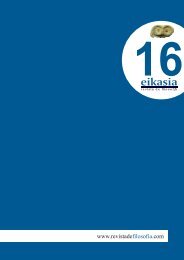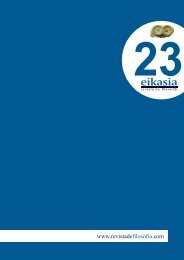7 - EIKASIA - Revista de Filosofía
7 - EIKASIA - Revista de Filosofía
7 - EIKASIA - Revista de Filosofía
Create successful ePaper yourself
Turn your PDF publications into a flip-book with our unique Google optimized e-Paper software.
60<br />
MAY O<br />
2012<br />
Ontología <strong>de</strong>l cuerpo y estética <strong>de</strong> la enfermedad en Jean-Luc Nancy; <strong>de</strong> la téchne <strong>de</strong> los cuerpos a la apostasía <strong>de</strong> los órganos | Dr. Adolfo Vásquez Rocca<br />
Abstract<br />
Jean-‐‑Luc Nancy travels through the body as a Summa, as a<br />
corpus, it subtracts the bio-‐‑teleological horizon of the body<br />
for <strong>de</strong>livery to the event horizon, which means stop<br />
thinking about a body organized on the basis of a purpose<br />
separate from each other thereof.<br />
Nancy <strong>de</strong>velops a philosophy of the body which reverses<br />
the generally accepted interpretation around the place<br />
(subordinate) of the body in the constitution of the mo<strong>de</strong>rn<br />
subject. Hence, Nancy insists that "ʺwe have a body but we<br />
are one body."ʺ Thus the new ontological and<br />
epistemological status of the body not only make new forms<br />
of subjectivity, but also a "ʺnew flesh"ʺ. So at the boundaries<br />
between natural and artificial raises the possibility of<br />
thinking in a fragmented body, a body whose organs have<br />
been emancipated, as Deleuze and Guattari called the Body<br />
Without Organs. As will the knowledge of the entire body<br />
and is never absolute, but modal split, and the best form of<br />
speech acts such knowledge is of a Corpus precisely<br />
mapping, an inventory of areas of the body that provi<strong>de</strong>s a<br />
set of approaches, revealing what Nancy called himself<br />
"ʺbody signs"ʺ. Thus we are interested in Corpus is not all<br />
organic but <strong>de</strong>tached parts and possible, in multiple<br />
relationships.<br />
In parallel, examine the post-‐‑humanist thought, <strong>de</strong>veloped<br />
by Sloterdijk, their philosophical sources and technical<br />
means, then, from there to address the problem of<br />
otherness, the reconfiguration of subjectivity and ontology<br />
of the body such as is proposed by Jean-‐‑Luc Nancy . This<br />
will review the phenomenon of anti-‐‑technology hysteria, the<br />
metaphors and eschatology of the disease, <strong>de</strong>epening the<br />
experience of a transplant recipient to finish discussing the<br />
ethical implications of this sort of ontology of the body that<br />
begins to take shape, a modal ontology -‐‑ if you will-‐‑because<br />
the body is related more positions, tensions, and weights,<br />
with essences or substances.<br />
Keywords<br />
Body, anthropology, bioethics, biotechnology, thought,<br />
humanism, posthumanism, bio-‐‑politics, medicine, machine,<br />
Artificial, ontology, subjectivity, transplantation, genetics.


